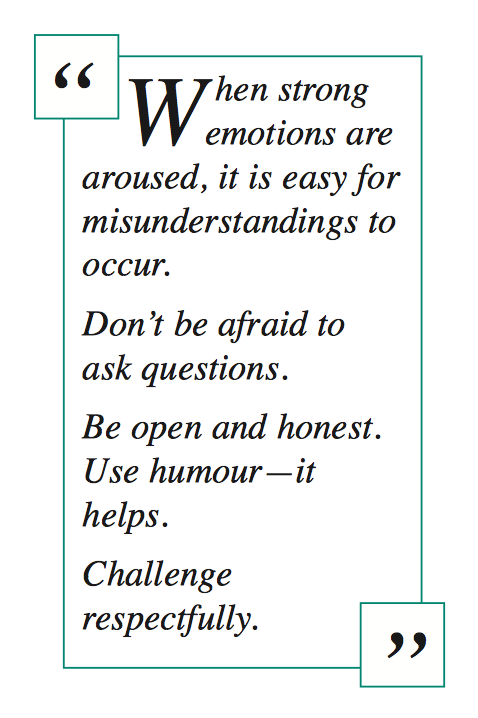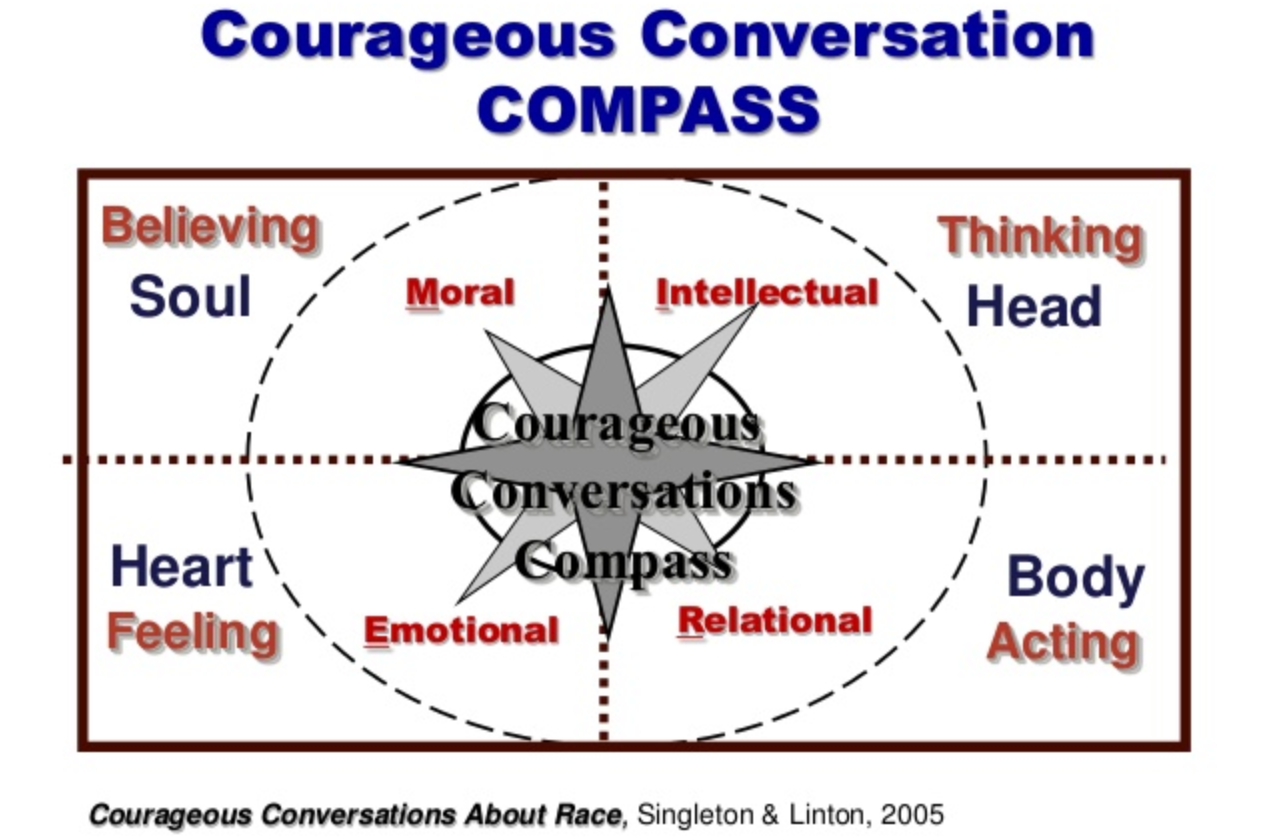
At some point in a child’s educational career, families and teachers will face a difficult conversation that needs to be handled with respect and integrity. These are not easy. It could be something simple like the inevitable phone call home about a minor altercation or something more difficult such as discussing a child’s ongoing struggle to keep up with the prescribed curriculum. Such conversations require both families and schools to step back, tread carefully, and engage in respectful and courageous conversations that always keep the best interests of the child in mind.
A Note to School
My child is struggling. She knows it. I know it. You know it. The curriculum is modified and the supports are in place, but school continues to be her greatest source of frustration, which is now spilling over into our family life. She doesn’t feel welcome, she doesn’t feel valued, and we fight to get her to school everyday. I’m having a hard time trying to determine next steps. Help!
A courageous parent

No matter how hard we try as families and schools, there are conversations that are often risky, sometimes when we least expect it. We can begin with global conversations about family-school engagement, ensuring that what we say and do is filtered through that lens. But we also know that there are more complex conversations that need to take place in family-school environments, often putting our family-school engagement at risk. With children’s short and long-term success as our goal, the stakes are high, opinions may differ, and strong emotions may be present, largely due to our own personal experience, efficacy, and perceptions.
- What is the most difficult conversation you can imagine having? Have you anticipated possible responses – positive and negative?
- What are the possible risks? What are the possible gains?
- What type of relationship already exists between family and school? Have we done the work of getting to know each other?
- Have you tread carefully into the conversation and ensured that all felt valued, respected, and honoured?
 Applying the principles of courageous conversations to all we say and do within family-school communities can ensure that the interactions between family and school are real, meaningful, and energizing, always with the best interests of the child in mind. No matter what the conversation or who is involved, these general guidelines, applied within the context of your unique family-school community, can help to to ensure a positive and productive outcome for families and schools, one that leaves all feeling valued and respected.
Applying the principles of courageous conversations to all we say and do within family-school communities can ensure that the interactions between family and school are real, meaningful, and energizing, always with the best interests of the child in mind. No matter what the conversation or who is involved, these general guidelines, applied within the context of your unique family-school community, can help to to ensure a positive and productive outcome for families and schools, one that leaves all feeling valued and respected.
 Believe in, and commit to, the possibility. Know that success looks and sounds different for each child, each family, and each school community. What we must hold fast to is a strong belief that each child will find their own path. Recognize that some families will feel loss and anxiety with regard to their child’s achievement and well-being. Reinforce individual differences as being the greatest similarity we share. Commit to success.
Believe in, and commit to, the possibility. Know that success looks and sounds different for each child, each family, and each school community. What we must hold fast to is a strong belief that each child will find their own path. Recognize that some families will feel loss and anxiety with regard to their child’s achievement and well-being. Reinforce individual differences as being the greatest similarity we share. Commit to success.
Plan your conversation. Where will it take place? Who will be there? Ensure that both families and schools feel comfortable and at ease discussing what is in the child’s best interests. Outline the purposes of the conversation up front and ensure that no participant feels intimidated or uncomfortable in the conversation. Consider openers such as “This may be a difficult conversation, but I am confident that it will be beneficial to all involved…”
 Have a sense of what you are trying to achieve. Think through the purpose of the conversation – it is to share your observations/feelings, to establish a plan, or to problem-solve? Make sure that family (and child) knowledge is honoured and valued alongside school knowledge. Work together to achieve what is best for the child.
Have a sense of what you are trying to achieve. Think through the purpose of the conversation – it is to share your observations/feelings, to establish a plan, or to problem-solve? Make sure that family (and child) knowledge is honoured and valued alongside school knowledge. Work together to achieve what is best for the child.
Stay positive. While not always easy, do your best to approach the conversation in a positive way; this will establish a productive and respectful tone that allows all participants to own the conversation, feel good about themselves, and be open to making changes.
Be clear about your role in this conversation. Understand how conversational intent aligns with a family’s or a school’s values. Recognize that the family is, and will always be, the most powerful educator of their child and that they know their child best. Families, as well, need to recognize that schools apply their professional knowledge to help move the child from where they are to where they can be. Bringing the two roles together ensures productive and meaningful conversation.
 Listen first. Once you have outlined the area, topic, incident that you want to discuss, ensure that both families and schools have an interrupted opportunity to provide their perspectives on the situation (be sure to use “I messages” and not allocate blame). Try not to be so focused on what you want to say that you forget to listen to what is being said. Ask questions to confer and clarify understanding. It is through actively listening that we may find a deeper awareness of the struggle, and identify productive and reasonable ways to move toward success.
Listen first. Once you have outlined the area, topic, incident that you want to discuss, ensure that both families and schools have an interrupted opportunity to provide their perspectives on the situation (be sure to use “I messages” and not allocate blame). Try not to be so focused on what you want to say that you forget to listen to what is being said. Ask questions to confer and clarify understanding. It is through actively listening that we may find a deeper awareness of the struggle, and identify productive and reasonable ways to move toward success.
Offer reassurance – foster the belief that “We are all in this together.” There is an art to building and maintaining relationships and social capital while trying to share information or perspectives that may be difficult to hear. It is particularly difficult for families to hear that their child may be struggling. Be aware that some families will move through a range of emotions from denial to anger and finally acceptance regardless of the age of their child.
Be real and be authentic. Don’t be afraid to share your responses or discomforts about a situation. Sometimes sharing uncertainties, ambiguities, or even previous experiences allows both parties to see through their predetermined roles and make connections on a more authentic level.
Use descriptive not evaluative/judgmental or educational language. Articulate observations and support with concrete evidence where possible. Talk about the child’s work or observations of the child’s behaviour in a factual, non-judgmental way that enhances understanding and separates the child from his/her work and behaviour.
 Focus on solutions. The goal of the discussion, if possible, is to understand the situation now without getting lost in blame, pointing fingers, or playing the what-if game. While you may not reach complete consensus about what is best, what is important is to push the the conversation toward finding solutions that are acceptable to all.
Focus on solutions. The goal of the discussion, if possible, is to understand the situation now without getting lost in blame, pointing fingers, or playing the what-if game. While you may not reach complete consensus about what is best, what is important is to push the the conversation toward finding solutions that are acceptable to all.
What can you add based on your experience?


Sage thoughts to consider when engaging anyone in a courageous conversation whose goal is find authentic solutions. The focus on openness and “listening first” reminds me of the old “2:1 ratio communication rule”, based on the human anatomy of two ears and one mouth. i.e. Choose to listen twice as much as you speak. Thanks for keeping the “engaging families engaging schools” posts fresh and alive!